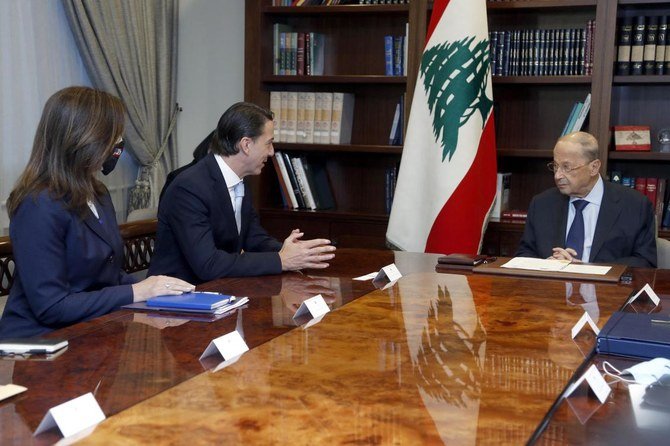Amos Hochstein, the US envoy appointed by the Biden administration this month to mediate Lebanon’s maritime border dispute with Israel, held talks on Wednesday with Lebanese President Michel Aoun, Parliament Speaker Nabih Berri and Prime Minister Najib Mikati on the future of the negotiations.
Aoun expressed “Lebanon’s readiness to continue to cooperate positively” with the process. However, the points of contention remain.
“The administration of President Joe Biden is ready to help Lebanon and Israel find a mutually acceptable solution to their common maritime borders,” the State Department said.
Hochstein, who is also the State Department’s senior adviser for energy security, also met Foreign Minister Abdullah Bou Habib, Energy Minister Walid Fayyad and army commander Gen. Joseph Aoun.
The speaker’s office said Berri’s discussion with Hochstein focused on “multiple files, particularly the demarcation of the maritime and land border between Lebanon and occupied Palestine. The framework agreement announced in October last year was confirmed.”
The US administration’s framework agreement for talks, which was implemented a year ago by Assistant Secretary of State for Near East Affairs David Schenker, includes two demarcation zones, for land and maritime borders. In accordance with the agreement, the US acts as mediator at the request of both sides.
Lebanon has been seen as struggling with the demarcation of its maritime borders. After submitting a border proposal to the UN in 2011, Lebanese officials decided that it was based on mistaken estimates and demanded an additional 1,430 square kilometers, an area that includes part of Israel’s Karish gas field. The Israelis oppose this.
Berri told Hochstein: “We have a new opportunity to resume negotiations in the southern Lebanese town of Naqoura, thanks to the new US efforts in this context.”
He also highlighted “the importance of excluding Lebanon from the sanctions of Caesar’s law in the topics of piping Egyptian gas and electricity from Jordan through Syria to Lebanon.” Lebanon has been experiencing widespread power outages as a result of fuel shortages amid a crippling economic crisis. The Caesar Act is US legislation sanctioning the Syrian government for war crimes against the Syrian people.
“The US envoy conveyed to Berri an optimistic view about positive progress being achieved in what relates to these matters,” the speaker’s office said.
Oil industry governance expert Diana Al-Qaisi told Arab News: “The US mediator has reached out to the Egyptian minister of electricity regarding redirecting the Egyptian gas into Lebanon.”
She added that Hochstein’s talks in Lebanon focused on diplomacy and how best to facilitate negotiations between Lebanon and Israel on their maritime border to agree a mutually acceptable solution, though Lebanon continues to stand firm in its demands.
Lebanese officials have yet to agree a strategy for the next phase of negotiations and their starting point for talks on the border.
The focus of Lebanese authorities then shifted on Wednesday to the nation’s financial crisis and a forensic audit of Banque du Liban, the country’s central bank. President Aoun met a delegation from the company Alvarez and Marsal, who informed him that the audit of the bank’s accounts was due to begin on Thursday morning. Aoun urged them to work quickly due to the urgency of the task.
On Tuesday, the International Monetary Fund opened negotiations with the Lebanese government to agree a strategy to begin to address the country’s insolvency.
Jihad Azour, director of the IMF’s Middle East and Central Asia department, stressed the need to address the losses faced by the financial sector and determine an accurate picture of the current financial situation in the country.
“Last time we had a full update of the situation was August 2020, before the resignation of the previous government, therefore many things have happened and we need to update the numbers and have a new baseline,” he said.

